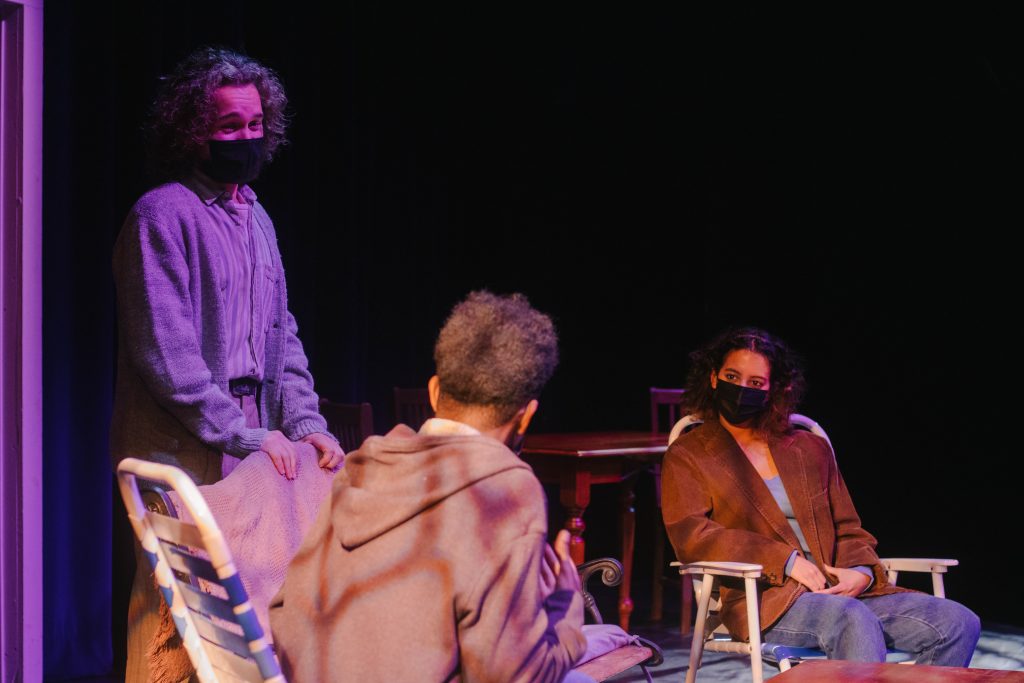Few pieces of theatre feel as raw and real as “Proof,” a play by David Auburn performed recently at Binghamton University’s Gruber Theater.
“Proof” follows Catherine, the prodigal daughter of Robert, a genius but crazed mathematician, who struggles to cope with both her father’s death as well as her own debilitating depression. In addition to this, Catherine confronts her relationship with Hal, a former student of her father’s, who battles his own insecurities, as well as her sister Claire, a bubbly, metropolitan businesswoman who looks to sell the family home to move Cate to New York so she can be closer. A web of tension and struggle is all brought to a head by the discovery of a groundbreaking mathematical proof with Cate as the disputed author.
In searching for a play, director Andrew Ajaka, a senior majoring in theatre, wanted to select a piece that emphasized mental health.
“After this past year and a half of the [COVID-19] pandemic, I was incredibly aware of how traumatic an event it had been and how relatively collective of an experience that was,” Ajaka wrote in an email. “This paired with the lack of space or regard for mental health in most places of work and schools was something that worried me going back into an in-person semester. I was looking for a show that would give me an opportunity to hold space for how tangible and physical the impacts of mental health can be as someone is working through a traumatic event, and came across ‘Proof,’ this play that I’d read my freshman year that really highlighted all of the things I wanted to say, while also being an incredibly intriguing story.”
The personal and impactful themes present within the play were brought out in a potent way by a company that gave believable, realistic performances. Each performer carried a genuine air with them throughout the show which came out in both the most subtle moments and the most explosive moments. These performances were aided by Ajaka’s very natural staging, which utilized the stage’s multiple levels to give the characters room to breathe and grow.
It was no surprise to learn about how the cast pulled aspects from their life experiences and the world we live in to build their characters.
Sarah Wallikas, a senior double-majoring in theatre and English who played Claire, explained how she drew from the characters in her life to prepare.
“It wasn’t that difficult once you start to see the Claires in your life,” Wallikas wrote. “Maybe my own family members wouldn’t try and sell my own house from under me, but she is coming from a place of protective instinct for Catherine. I went about it like this; Claire sees Catherine as the one who took care of things personally day-to-day when it came to their father’s mental illness, while Claire saw herself as the one who is funding that care … Claire is a cleaner of messes. We even represented [that] in the task I’m performing the first time that the audience sees me: I’m cleaning up the set.”
Connor Celeste, a junior majoring in integrative neuroscience, built his own character for Robert from internal dialogue and reflection.
“My biggest preparation was opening up an internal dialogue to determine how often it is that I pretend to be someone or something I am not in an everyday setting,” Celeste wrote. “The answer didn’t surprise me as it was often. I feel like we all tend to hide behind faces of characters we think other people want to see, but on the stage we don’t want to see characters, we want to see people with real emotions and real convictions.”
One of the play’s main sources of conflict was the intellectual tension between Hal and Cate over her ability to write the proof, with Hal struggling to confront his limitations.
Patrick Saint Ange, a junior double-majoring in sociology and English who played Hal, discussed his process in giving the character depth beyond his misogynistic surface.
“When playing any character, especially one you may personally disagree with, it’s important to remember that everyone is the hero of their own story,” Ange wrote. “My version of Hal doesn’t recognize his distrust of Catherine as being rooted in misogyny. His pride in his work, his insecurities about his own intellectual shortcomings and his experiences in his male-dominated field motivate his actions and beliefs. That understanding makes it much easier to connect with Hal even if we don’t agree with all of his choices.”
In terms of executing the realism and rawness of the script, Ajaka had nothing but praise for his cast and crew.
“I absolutely trusted them to tell this story with me, and they had their own trust in my vision and the story I was interested in telling,” Ajaka wrote. “I am incredibly grateful for the faith they showed in me and my vision and to have been working so collectively with them all to actualize it.”
Saint Ange hoped audiences took away the ability to not fear the past and to see creativity all around them.
“I hope audiences connect to the very real relationship shown in this play and remember that embracing the past does not mean we’re doomed to relive it, in fact, that may be the only way to truly grow from it,” Ange wrote. “I also hope audiences remember that creativity and artistry exist in all facets of life. And that creativity can come from anyone from anywhere. We just have to be willing to listen.”



